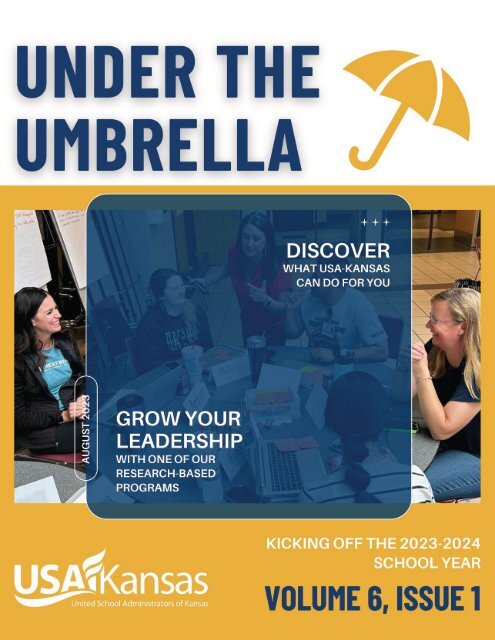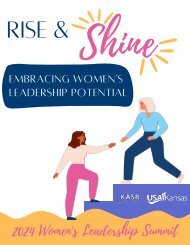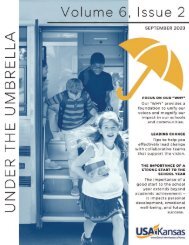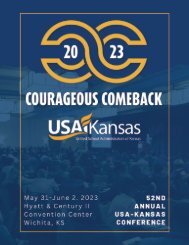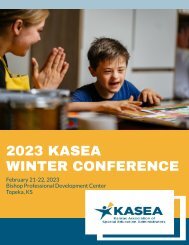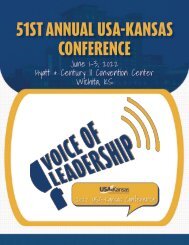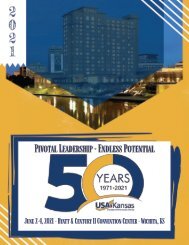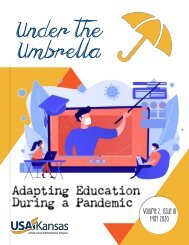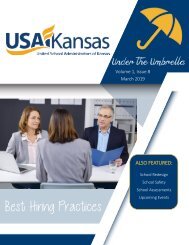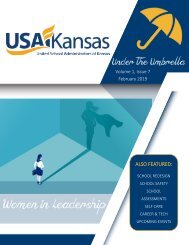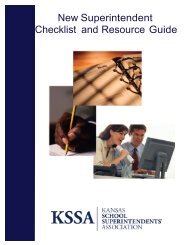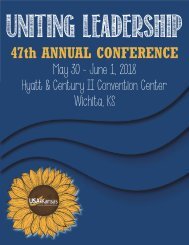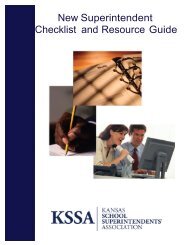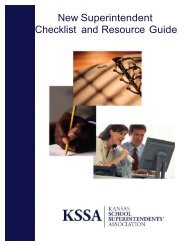Under the Umbrella, Volume 6, Issue 1
You also want an ePaper? Increase the reach of your titles
YUMPU automatically turns print PDFs into web optimized ePapers that Google loves.
CONTENTS<br />
WELCOME BACK!<br />
2-3 How Can I Help?, G.A. Buie<br />
<strong>Volume</strong> 6, <strong>Issue</strong> 1<br />
NETWORK &<br />
STAY CONNECTED<br />
Facebook.com/USAKansas<br />
@USAKansas<br />
4-6<br />
8-9<br />
10-12<br />
14-15<br />
16-23<br />
What Does <strong>the</strong> Future<br />
Hold?, Jerry Henn<br />
Lead As a Learner, Jessica<br />
Griffin<br />
I’m a New Principal...Now<br />
What?, Cara Ledy<br />
Executive Coaching, Dr.<br />
Martin Stessman<br />
In Perspective: The New<br />
NAEP Data & Student<br />
Achievement Gaps, Dr. Gene<br />
Kerns<br />
2022-2023 Board of Directors<br />
Todd Dain- President<br />
- President-Elect<br />
Amy Haussler - Past President<br />
Jamie Rumford - KSSA<br />
Stacey Green - KPA<br />
Kurt Seiler - KPA<br />
Doug Anderson - KASEA<br />
Juanita Erickson - KSSA<br />
Volora Hanzlicek - KASCD<br />
Ryan Flurry - KLCTE<br />
Cindy Couchman - KSSA<br />
Craig Correll - KSSA<br />
Renee Nugent- KSSA<br />
Michelle Hackney - KASPA<br />
Jaclyn Pfizenmaier - KASCD<br />
Bryce Wachs - KanSPRA<br />
Scott Carson - KPA<br />
Eric Armstrong - KPA<br />
Andrew Dempewolf - KPA<br />
G.A. Buie - Executive Director<br />
Jerry Henn - Assistant Executive Director<br />
Jessi Clark - Communications Coordinator
As we glimpse around <strong>the</strong> corner at <strong>the</strong> start<br />
of a new school year, I have some good and<br />
even better news. The good news is <strong>the</strong> finish<br />
line hasn’t moved. The even better news is<br />
you have more tools than ever to support<br />
your students’ growth. The new opportunities<br />
are exciting and concerning at <strong>the</strong> same time.<br />
I have <strong>the</strong> opportunity to share some new<br />
opportunities after tearing my rotator cuff<br />
last spring, leading to surgery this summer.<br />
Like many of your kids, <strong>the</strong> loss of mobility in<br />
my arm has brought uncertainty, adjustment,<br />
and increased trust and reliance on o<strong>the</strong>rs to<br />
support <strong>the</strong> recovery.<br />
My temporary situation has opened my eyes<br />
to a student with a disability or a student<br />
experiencing challenges with home life or<br />
o<strong>the</strong>r anxieties. Although my recovery time
frame is short, I’ve still had plenty of<br />
encounters requiring help. I hate to<br />
ask for help. I convince myself I can<br />
get through it. Many students with<br />
challenges feel <strong>the</strong> same. They don’t<br />
want to ask for help; <strong>the</strong>y feel like<br />
nobody understands <strong>the</strong>ir struggle. After<br />
all, asking or using assistance makes you<br />
weak… Wrong! At home, I knew who<br />
to ask, and ultimately, my family knew<br />
what I was trying to accomplish. Some<br />
kids are <strong>the</strong> same. When <strong>the</strong>y are in<br />
a safe and comfortable setting, <strong>the</strong>y<br />
know how to ask questions, but too<br />
often, too many kids don’t understand<br />
<strong>the</strong> questions to ask because <strong>the</strong>y don’t<br />
understand what <strong>the</strong>y can and can’t<br />
accomplish.<br />
Now, <strong>the</strong> difference between my injury<br />
and a child with challenges: My road<br />
back depends greatly upon my effort to<br />
get <strong>the</strong>re. I had experience of what I<br />
had done before <strong>the</strong> injury. Oh yes, I’ve<br />
got Erin and Will, my physical <strong>the</strong>rapists,<br />
to help me achieve <strong>the</strong> goals set by<br />
<strong>the</strong> doctor, and I should get back to<br />
pre-injury levels. Students that have<br />
learning challenges or o<strong>the</strong>r physical<br />
challenges often don’t have <strong>the</strong> landmark<br />
of “before <strong>the</strong> injury” ; it’s very much a<br />
new learning experience for most of <strong>the</strong><br />
students.<br />
I started my path back to full mobility<br />
with a 90-minute surgery to repair <strong>the</strong><br />
rotator cuff and o<strong>the</strong>r items dealing<br />
directly with my shoulder. Waking up<br />
after surgery with limited mobility in<br />
my right arm and unskilled mobility<br />
in my non-dominant arm, my left arm.<br />
Wearing a large foam pillow with a sling,<br />
people immediately notice you might<br />
need assistance. For many of your kids,<br />
<strong>the</strong>y don’t have a noticeable challenge.<br />
I received help from strangers because<br />
<strong>the</strong>y can see my disability, but what<br />
about <strong>the</strong> kid who looks OK, but <strong>the</strong>y<br />
are dealing with something? Make sure<br />
your team is ready to reach out to ask<br />
“how <strong>the</strong>y can help.” I want to repeat<br />
that phrase, it’s not, do you need help,<br />
teach your team to ask “How can I<br />
help?”<br />
The point I’m trying to make is, as you<br />
approach this new year, let’s adjust our<br />
mindsets and refocus our skills. Ra<strong>the</strong>r<br />
than saying “Can I help you?” thinking<br />
<strong>the</strong>re is something we can do to make<br />
someone’s life a little easier, let’s dig a<br />
little deeper to understand <strong>the</strong> issue<br />
first, <strong>the</strong>n learn to ask “How can I help<br />
you?” This acknowledges that you see<br />
<strong>the</strong>ir challenge, and you’re here to<br />
help <strong>the</strong>m achieve. I know it’s a small<br />
difference, but when someone asks me,<br />
“Can I help you?” I almost always say<br />
no, but when asked “How can I help?”<br />
I quickly respond with how <strong>the</strong>y can<br />
assist.<br />
Now let’s give it a try. I know you are<br />
getting ready for a new year. “How can<br />
I help you?” USA-Kansas is here to<br />
support you and your teams. Make sure<br />
you reach out and let us know how we<br />
can assist.<br />
3
The first statement I need to make is<br />
please vote in <strong>the</strong> upcoming election!<br />
When looking at <strong>the</strong> future for our<br />
education from <strong>the</strong> political side, I<br />
wish I had all <strong>the</strong> answers. What I<br />
can do is look at <strong>the</strong> past bills that<br />
were introduced to see what are<br />
<strong>the</strong> possibilities. As you probably<br />
know, any opinion I might give is only<br />
speculation on my part. I will keep my<br />
comments to facts as I know <strong>the</strong>m.<br />
Probably <strong>the</strong> biggest item that will be<br />
4<br />
brought back this coming legislative<br />
session will be some type of tax cut.<br />
Last year <strong>the</strong> legislature discussed a<br />
single tax rate for all. Even though<br />
this is not a direct education<br />
bill, it will majorly effect funding<br />
for education. The bill that was<br />
introduced did cut individual taxes a<br />
little, but it cut business taxes a bunch.<br />
Some type of voucher bill will again<br />
find its way to <strong>the</strong> floor. What it will<br />
look like will be <strong>the</strong> question. Looking<br />
at bills that have passed in o<strong>the</strong>r<br />
states, <strong>the</strong> scholarship aspect will be
ack. Hopefully you remember this<br />
focuses on setting up accounts for<br />
students/homeschool/private school<br />
students to use for <strong>the</strong>ir education/<br />
tuition. O<strong>the</strong>r states that have passed<br />
this bill have shown that much of <strong>the</strong><br />
money in <strong>the</strong> accounts have gone to<br />
students already in private school.<br />
LGBTQ+ bills will continue to be<br />
an issue with <strong>the</strong> current legislature.<br />
No one really knows where this will<br />
go. Best advice is to just protect all<br />
students.<br />
Parents’ bills of rights have been<br />
passed in several states as well.<br />
This has been a bill that has been<br />
successfully defeated each year in<br />
Kansas. The Governor has been<br />
a major help in this effort. A bill<br />
of rights for parents is smoke and<br />
mirrors. Parents already have rights.<br />
Let <strong>the</strong>m know what rights <strong>the</strong>y have.<br />
Help educate your parents as to what<br />
<strong>the</strong>ir rights are now. Communication<br />
is key between schools and parents/<br />
community. Keep <strong>the</strong>m all in <strong>the</strong> loop<br />
of what is happening in your schools.<br />
to keep people safe, <strong>the</strong> schools will<br />
be a focus.<br />
Lastly, we know that special education<br />
funding will be discussed. The<br />
92% has become a major factor in<br />
discussion on both sides, meaning<br />
legislators and education institutions.<br />
I need to make one thing very clear.<br />
The 92% is purely a funding target by<br />
<strong>the</strong> state. It really has nothing to do<br />
with school districts and you should<br />
not be held to this 92% number. It<br />
is a state funding target. I cannot say<br />
this enough. It has been stated by a<br />
senator that we have 150 districts<br />
that meet this 92%, that is true, but<br />
this represents approximately 33%<br />
of <strong>the</strong> students in Kansas. The<br />
92% is not a district item to be<br />
concerned since this is a state budget<br />
issue. Please when you talk to your<br />
legislator about special education<br />
funding, make sure <strong>the</strong>y understand<br />
<strong>the</strong> funding is a state responsibility<br />
to fund and has nothing to do with<br />
school budgets.<br />
There are plenty of bills that were<br />
introduced this year. The ones I<br />
discussed above are <strong>the</strong> major ones<br />
we need to be aware of. There will<br />
be new ones coming to us I’m sure,<br />
but I am not sure what <strong>the</strong> focus will<br />
become.<br />
Getting <strong>the</strong> lead out of <strong>the</strong> water will<br />
be discussed. The national news has<br />
reported in July that <strong>the</strong>re will be a<br />
movement at <strong>the</strong> national level to get<br />
lead pipes out of dispensing water to<br />
families and businesses. This was not<br />
directed at schools, but when <strong>the</strong>re<br />
5<br />
are movements at <strong>the</strong> national level
Now let’s talk about <strong>the</strong> convention.<br />
Special thanks to all who attended. It<br />
was a special time in Wichita for sure.<br />
As I looked at <strong>the</strong> conference<br />
evaluations <strong>the</strong>re was one item that<br />
clearly stood out. Gerry Brooks was<br />
definitely a highlight. I would agree!<br />
His message was delivered with<br />
humor which made us all leave feeling<br />
good about ourselves. We can laugh,<br />
learn, process <strong>the</strong> message, and put it<br />
to use this following school year.<br />
With <strong>the</strong> number of attendees, we<br />
knew <strong>the</strong>re would be an issue with<br />
rooms filling up. I made some changes<br />
to <strong>the</strong> schedule and doubled up<br />
several sessions to spread out <strong>the</strong><br />
attendees. I felt this was successful<br />
and plan to use this next year.<br />
The food also was highly rated on<br />
<strong>the</strong> evaluation. The Hyatt Hotel and<br />
Houston work hard to get good food<br />
for us all. The undertaking to get this<br />
settled is unbelievable.<br />
We had many positive comments<br />
about <strong>the</strong> sessions. We have quality<br />
administrators in Kansas. Their<br />
contributions to <strong>the</strong> education of<br />
our students are absolutely amazing.<br />
Thank you all. Your work with our<br />
students is evident every day.<br />
The USA Convention cannot happen<br />
without many people behind <strong>the</strong><br />
scenes. Sara, Kim, Jessi C. and<br />
Houston totally understand what<br />
needs to happen and when. It makes<br />
my job much easier. They know<br />
where to be and when to be <strong>the</strong>re.<br />
They have <strong>the</strong> contacts with Hyatt<br />
personnel so changes can be made<br />
at a moment’s notice. Jessica G.,<br />
Cara, Marty, Jim and G.A. provide<br />
educational experience to keep us all<br />
grounded in research-based practices.<br />
To have all <strong>the</strong> attendees at <strong>the</strong><br />
convention just tells me we need to<br />
continue to have opportunities for<br />
educators to have a place for learning<br />
and relaxation. Thank you all for your<br />
attendance and support.<br />
The vendors continue to be a<br />
highlight too! Prizes also are a huge<br />
factor in <strong>the</strong> success. Although we<br />
have received some comments that<br />
prize might be awarded anytime<br />
during <strong>the</strong> conference. That becomes<br />
a major conflict for us as <strong>the</strong>re is<br />
plenty to do during <strong>the</strong> conference.<br />
6
Mammoth is a modern master build firm. We can consult, create, and<br />
Is Your District Protected?<br />
School Districts like yours are a<br />
prime target of cybercriminals.<br />
Academic institutions need a solution that<br />
protects against cyber threats, from simple to<br />
sophisticated. CrowdStrike protection powers<br />
districts against ransomware and<br />
cyber attacks.<br />
Contact KCAV<br />
to learn more about how<br />
CrowdStrike allows you to defend<br />
against <strong>the</strong> adversaries of tomorrow.<br />
sales@kcav.com<br />
800-798-5228 x165<br />
construct sports projects of every size.<br />
Our team is made up of former professional athletes, coaches, and fans who<br />
can assist with every aspect of a sports construction project; from idea to<br />
plan, design to fundraising, and marketing to construction.<br />
BUILD WITH MAMMOTH<br />
THROUGH GREENBUSH<br />
MARKETPLACE.<br />
Skip <strong>the</strong> RFP process for your next capital outlay<br />
project. Mammoth’s design and build services are<br />
available through Greenbush, which meets all<br />
Kansas legal and procurement requirements.<br />
STEVE NOBLE<br />
Mammoth Director Of<br />
Business Development<br />
Former USD 345<br />
Superintendent<br />
CALL OR EMAIL:<br />
(785) 250-8871<br />
steve.noble@mammothbuilt.com<br />
MAMMOTHBUILT.COM<br />
CONSULT. CREATE. CONSTRUCT.
8
The excitement of a new school year is<br />
a magical feeling for a building principal<br />
and is just around <strong>the</strong> corner! There’s<br />
so much possibility for <strong>the</strong> upcoming<br />
year; new staff joining <strong>the</strong> school family,<br />
reconnecting with returning staff<br />
members, and implementing changes<br />
planned over <strong>the</strong> summer months spent<br />
in reflection. Those first few days when<br />
staff return are a flurry of meetings,<br />
professional learning opportunities, and<br />
<strong>the</strong> energy level is at an all time high. As<br />
<strong>the</strong> first few weeks of school begin and<br />
students return to fill <strong>the</strong> hallways and<br />
classrooms, staff warmly welcome <strong>the</strong>m<br />
into <strong>the</strong>ir new learning environment.<br />
How does a building principal<br />
bottle <strong>the</strong>se energizing and inspiring<br />
emotions of <strong>the</strong> beginning of <strong>the</strong> year<br />
as <strong>the</strong> challenges and setbacks of <strong>the</strong><br />
remainder of <strong>the</strong> year occur? Now<br />
more than ever it is imperative that<br />
building principals take time to prioritize<br />
<strong>the</strong>ir own learning and collaboration<br />
with o<strong>the</strong>r leaders to maintain <strong>the</strong><br />
emotional energy needed to sustain a<br />
positive, high performing school culture.<br />
The Elevate Leadership series serves<br />
to meet this need for our building<br />
principals in Kansas. At USA, our<br />
vision is to build world class leadership,<br />
<strong>the</strong>refore world class student success.<br />
We encourage you to join <strong>the</strong> staff at<br />
USA in our leadership journey pathway<br />
that begins with <strong>the</strong> Elevate Leadership<br />
1 experience. We meet in five regional<br />
locations throughout <strong>the</strong> state six times<br />
throughout <strong>the</strong> year. Each of <strong>the</strong>se<br />
days is spent in professional learning,<br />
collaboration with o<strong>the</strong>r building level<br />
leaders, reflection, and action planning<br />
for impact back at <strong>the</strong> building. The<br />
series is designed to build <strong>the</strong> capacity<br />
and network of leaders across our state.<br />
Research shows that principals who are<br />
engaged outside of <strong>the</strong>ir internal district<br />
circle are more effective in influencing<br />
results than principals who solely focus<br />
on internal instruction (Kirtman, 2021).<br />
Now is <strong>the</strong> time to get engaged with<br />
o<strong>the</strong>r leaders in your area! Join us<br />
in an Elevate Leadership cohort this<br />
year. Prioritize your own learning and<br />
collaboration so you lead as a learner in<br />
your building. Let this cohort help you<br />
maintain <strong>the</strong> emotional energy needed<br />
to sustain <strong>the</strong> positive, high performing<br />
culture you set out to create at <strong>the</strong><br />
beginning of each magical school year!<br />
Register for Elevate Leadership HERE.<br />
Reach out to Jessica Griffin at jgriffin@<br />
usakansas.org or 620-340-3340 with any<br />
questions you may have. The Elevate<br />
Leadership series is included with a<br />
district’s PLN membership.<br />
Credit To:<br />
Research Findings on Leadership<br />
Effectiveness That Might Surprise You,<br />
Kirtman 2021<br />
The Principal 2.0 Three Keys to<br />
Maximizing Impact, Michael Fullan 2023<br />
9
10
I think many Principals can remember<br />
<strong>the</strong> first time <strong>the</strong>y became Principal<br />
of a building! It was a flood of<br />
emotions from excitement to fear,<br />
and everything in between. As I reflect<br />
on my first year as Principal I want to<br />
share my key take-aways.<br />
I appreciated all <strong>the</strong> support and<br />
advice I received from <strong>the</strong> many<br />
colleagues I came to know at that<br />
New Principal workshop I attended. I<br />
also remember feeling worried that I<br />
was doing all that I was supposed to<br />
do in a small 4A high school. There<br />
was not a manual or checklist, just a<br />
pile of unmarked keys for me to figure<br />
out! In reflection, The New Principal<br />
Workshop was more important than<br />
I realized at <strong>the</strong> time. I developed<br />
friendships that I have maintained<br />
since. I knew I could and did call <strong>the</strong>se<br />
peers and <strong>the</strong>y would help, advise, or<br />
just listen. Not many professions offer<br />
opportunities like this!<br />
I encourage you, New Principals,<br />
to start now developing your<br />
network and support team! The<br />
Kansas Principals Association(KPA)<br />
and United School Administrators<br />
of Kansas (USA-K), toge<strong>the</strong>r, have<br />
created many opportunities to<br />
help you with this process. Both<br />
associations are committed to helping<br />
Principals grow professionally, and<br />
create those networks that set<br />
Principals up for success!<br />
Ano<strong>the</strong>r piece of advice for New<br />
Principals is to get involved! Through<br />
KPA and USA, I was more aware of<br />
what my role as a Principal was, and<br />
<strong>the</strong> importance of Advocating for<br />
my students, staff, and community.<br />
But most of all, I felt like I was part<br />
of a bigger family that supported,<br />
encouraged, educated, and inspired<br />
me to be <strong>the</strong> best Principal I could<br />
be! Attend <strong>the</strong> KPA Conference<br />
November 7 & 8, in Wichita (Put it<br />
on your calendar now!). This is a<br />
great time to meet Administrators in<br />
your region and in buildings similar<br />
to yours. We learn from each o<strong>the</strong>r<br />
and experts in our field! Then attend<br />
<strong>the</strong> USA Conference May 29 - 31, in<br />
Wichita (Put in your calendar now).<br />
Here we network and get ideas and<br />
strategies for <strong>the</strong> next year through<br />
great keynote speakers and learning<br />
clusters!<br />
My last take-away from that first year<br />
as Principal was <strong>the</strong> importance of<br />
continual growth and development.<br />
This is also supported in <strong>the</strong> research<br />
from <strong>the</strong> Wallace Foundation. They<br />
stated that School leadership is<br />
second only to teaching among<br />
school-related factors in its impact<br />
on student learning. Their research<br />
also states that high-quality principals<br />
11
are vital to <strong>the</strong> effectiveness of our<br />
nation’s public schools, especially<br />
those serving <strong>the</strong> children with <strong>the</strong><br />
fewest advantages in life. An effective<br />
principal’s impact is stronger and<br />
broader than previously thought,<br />
making it “difficult to envision’’ a<br />
higher return on investment in K-12<br />
education than <strong>the</strong> cultivation of highquality<br />
school leadership – Wallace<br />
Foundation, February 2021.<br />
So I ask you - how are you<br />
intentionally planning on growing<br />
this upcoming school year? Both<br />
associations, KPA and USA, are<br />
combining to offer opportunities<br />
for you to grow and develop! First,<br />
I hope you were a part of <strong>the</strong> New<br />
Principal Workshop that was offered<br />
July 28 and August 4. I also hope you<br />
have secured a mentor through KELI<br />
to address <strong>the</strong> licensure requirements.<br />
If you did not get involved in ei<strong>the</strong>r<br />
of <strong>the</strong>se opportunities <strong>the</strong>n I hope<br />
you will consider Elevate 1. This is a<br />
6 session series spread throughout<br />
<strong>the</strong> year to help you discover <strong>the</strong><br />
importance of Mission, Vision,<br />
Academic Optimism, What Matters<br />
Most, and how to Lead Change. You<br />
can get signed up for this at https://<br />
www.usakansas.org/page/elevateleadership-year-1.You<br />
can contact<br />
ei<strong>the</strong>r organization and you will<br />
receive all <strong>the</strong> information you need<br />
12<br />
to get started on <strong>the</strong> right path for<br />
success! I would also be available to<br />
assist you as well and I can be reached<br />
at cledy@usakansas.org or call me at<br />
(316) 204-2339.<br />
Websites:<br />
KPA - https://www.ksprincipals.org/<br />
USA - https://www.usakansas.org/<br />
I wish all our New Principals <strong>the</strong> very<br />
best year! You have joined <strong>the</strong> best<br />
career <strong>the</strong>re is!!!<br />
CELEBRATING MOMENTS<br />
THAT MATTER<br />
Contact your Jostens<br />
representative today.<br />
www.jostens.com
MISS KANSAS 2023<br />
COURTNEY WAGES<br />
Courtney Wages is a graduate of Wichita State<br />
University with a Bachelor of Fine Arts in Musical<br />
Theater. Courtney's community service initiative is<br />
One Vision is Not <strong>the</strong> Only Vision: Eye See You. Her<br />
focus for this initiative is to educate communities<br />
about <strong>the</strong> importance of vision health and providing<br />
tools and resources for all to clearly navigate <strong>the</strong>ir<br />
way through life.<br />
Miss Kansas travels throughout <strong>the</strong> state working<br />
closely with <strong>the</strong> Kansas Department of Wildlife,<br />
Parks, Kansas Department of Transportation, Lead<br />
For America and Envision, Inc., providing education,<br />
and will advocate for blind and visually impaired<br />
(BVI) communities during her year as Miss Kansas.<br />
One Vision is Not <strong>the</strong> Only Vision: Eye See You<br />
Courtney has executed her initiative through innovative approaches and<br />
strategies. Over <strong>the</strong> past year, she presented her “Eye See You” Initiative which<br />
uses literacy to educate children on <strong>the</strong> importance of inclusion for BVI<br />
communities and how to prioritize vision care by protective eyewear, eating<br />
healthy foods, and exercise. To date, this specific arm of <strong>the</strong> initiative has<br />
reached over 900 students in grades K-5 across Kansas.<br />
TO BOOK:<br />
BOOKINGS@MISSKANSAS.ORG<br />
TOPICS<br />
Motivational Presentations<br />
One-on-one Mentoring<br />
Interactive Games<br />
Small Group Activities<br />
Signted Guide Trainings<br />
Vision Activities<br />
Interactive Books & Stories<br />
School Wide Assemblies<br />
Grade Level Presentations<br />
Tap Dance Performance
It has been my experience that life<br />
has a way of teaching us what we<br />
need to learn both personally and<br />
professionally. Sometimes we refer to<br />
<strong>the</strong>se as “life lessons.” Often, <strong>the</strong>se<br />
lessons follow a particularly difficult<br />
or painful experience when, after<br />
time and space allow, we are able to<br />
reflect on <strong>the</strong> experience and learn<br />
from it.<br />
What if we were able to learn that<br />
lesson before <strong>the</strong> event ra<strong>the</strong>r than<br />
after? How much better would<br />
our lives be if we could see around<br />
corners, anticipate problems, and<br />
reflect on an experience before<br />
it happens? That is <strong>the</strong> goal of<br />
executive coaching: to facilitate<br />
reflection on past events and<br />
anticipate future events in order to<br />
improve <strong>the</strong> outcome. Coaching<br />
sessions are a designated time for<br />
<strong>the</strong> administrator to remove him or<br />
herself from <strong>the</strong> daily grind and to<br />
think about <strong>the</strong>ir thinking.<br />
Through executive coaching,<br />
USA-Kansas staff facilitate both<br />
reflective and divergent thinking<br />
in administrators to improve<br />
<strong>the</strong> application of past lessons<br />
learned to current and future<br />
challenges. Through questioning,<br />
<strong>the</strong> administrators reflect on past<br />
experiences in order to learn from<br />
<strong>the</strong>m and <strong>the</strong>n use what <strong>the</strong>y learn<br />
to consciously and purposefully guide<br />
<strong>the</strong>ir actions and decision making in<br />
current and future situations.<br />
You might be thinking that you have<br />
good intuition and usually make good<br />
decisions, which is likely true or you<br />
wouldn’t be in your current position.<br />
Even good decisions, however, can<br />
have some negative consequences.<br />
Thinking those through in advance<br />
may result in a decision that is better<br />
than good. No matter how good we<br />
are, we can all improve in some way.<br />
As one administrator put it, even<br />
Michael Jordan needed a coach.<br />
For <strong>the</strong> sports minded among us, it is<br />
a little like practicing game situations<br />
in advance. When you find yourself<br />
down by 2 points with 6 seconds<br />
left in <strong>the</strong> game and inbounding <strong>the</strong><br />
ball under your opponent’s basket,<br />
<strong>the</strong> chances for a favorable outcome<br />
increase if you have practiced that<br />
situation in advance.<br />
CLICK HERE for more info.<br />
15
16
The recent release of <strong>the</strong> 2023 National<br />
Assessment of Educational Progress<br />
(NAEP) data brought ano<strong>the</strong>r flurry<br />
of reporting on <strong>the</strong> impacts wrought<br />
by pandemic-related disruptions to<br />
schooling.<br />
In fact, a recent District Administration<br />
article quoted Dr. Peggy Carr,<br />
commissioner of <strong>the</strong> National Center<br />
for Education Statistics, which oversees<br />
NAEP, remarking that “<strong>the</strong> ‘green shoots’<br />
of academic recovery that we had<br />
hoped to see have not materialized,<br />
as we continue to see worrisome<br />
signs about student achievement and<br />
well-being more than two years after<br />
most students returned for in-person<br />
learning.”<br />
To be sure, <strong>the</strong>re are some new and<br />
alarming findings in <strong>the</strong> NAEP data, such<br />
as dropping attendance rates, decreases<br />
in <strong>the</strong> time students spend reading,<br />
and decreased enrollment in algebra.<br />
There are also some findings that have<br />
been consistently documented since<br />
<strong>the</strong> pandemic began: scores are down<br />
at all grade levels, math has been more<br />
affected than reading, and some student<br />
groups have been disproportionately<br />
affected.<br />
After all this time, however, it’s becoming<br />
almost impossible to distinguish one<br />
report on unfinished learning from<br />
ano<strong>the</strong>r. While addressing <strong>the</strong> needs<br />
students currently have requires that we<br />
keep our sense of urgency high, what<br />
many of us are also longing for are fresh<br />
insights and a narrowing of our focus.<br />
Acknowledging that we can’t solve<br />
everything at once, where do we focus<br />
our attention for <strong>the</strong> greatest impact?<br />
In this blog, I’ll offer several suggestions<br />
based on an analysis of both NAEP and<br />
o<strong>the</strong>r recent assessment data.<br />
USING NAEP DATA TO<br />
PUT “LEARNING LOSS” IN<br />
PERSPECTIVE<br />
It’s a good day when I read something<br />
that provides me with an insight, but<br />
it’s a great one when I read something<br />
that provides me with an epiphany.<br />
Those don’t come along often, but when<br />
<strong>the</strong>y do, <strong>the</strong>y cause us to completely<br />
reorganize <strong>the</strong> way we interpret <strong>the</strong><br />
world. We just can’t look at things <strong>the</strong><br />
same way again. Such was <strong>the</strong> case when<br />
I read a 2020 Education Week article<br />
on learning loss written by formative<br />
assessment expert Dylan Wiliam.<br />
While “learning loss”—or “unfinished<br />
learning,” or whatever term you prefer<br />
for whatever <strong>the</strong> academic impacts<br />
of <strong>the</strong> COVID-19 pandemic were—<br />
remains a hot topic, Wiliam cautions<br />
that “it is also important to put<br />
whatever learning loss <strong>the</strong>re has been<br />
in perspective” (my emphasis). And <strong>the</strong><br />
perspective he suggests is not solely<br />
focused on <strong>the</strong> direct impacts of <strong>the</strong><br />
pandemic but considers learning loss in<br />
relation to <strong>the</strong> achievement gaps that<br />
already existed. When we do that, we<br />
17
find that we may have been focusing too<br />
closely on <strong>the</strong> wrong things. In o<strong>the</strong>r<br />
words, we have an epiphany.<br />
Writing in <strong>the</strong> back-to-school season<br />
of 2020–2021, Wiliam began with<br />
2019 NAEP data for math and <strong>the</strong>n<br />
“extrapolate[ed] beyond <strong>the</strong> grades<br />
tested by NAEP using nationally normed<br />
standardized tests” to suggest <strong>the</strong><br />
range of performance in “a nationally<br />
representative 4th grade class of 25<br />
students.” His analysis suggested that,<br />
in such a classroom, “<strong>the</strong>re were five<br />
students whose math achievement was<br />
no higher than <strong>the</strong> average 1st grader,<br />
and two students whose achievement<br />
would match that of <strong>the</strong> average 9th<br />
grader.” In o<strong>the</strong>r words, “in a nationally<br />
representative class of 4th graders, <strong>the</strong>re<br />
[was] at least an eight-year spread of<br />
achievement” prior to <strong>the</strong> pandemic.<br />
Wiliam added that “even if we assume<br />
that students learned nothing after<br />
schools began closing down in March<br />
[of 2020], it means that ra<strong>the</strong>r than<br />
an eight-year spread of achievement, a<br />
returning 5th grade class [in <strong>the</strong> fall of<br />
2020] would have [had] an eight-anda-half<br />
year range of achievement” after<br />
<strong>the</strong> pandemic hit. The headlines focused<br />
solely on this half-year increase ra<strong>the</strong>r<br />
than <strong>the</strong> existing 8-year spread.<br />
That seemed a bit off to Wiliam. It<br />
seemed to lack perspective.<br />
18<br />
COMPARING PANDEMIC<br />
“LEARNING LOSS” TO<br />
EXISTING ACHIEVEMENT<br />
GAPS<br />
Wiliam was not alone in making such<br />
a claim. Several months earlier, Will<br />
Lorié with <strong>the</strong> National Center for<br />
Assessment asserted that previously<br />
existing performance gaps “are greater<br />
than any differential ‘learning losses’ we<br />
will find between relatively advantaged<br />
and disadvantaged groups due to spring<br />
2020 school disruptions.”<br />
Hea<strong>the</strong>r Hill and Susanna Loeb made<br />
a similar point in a May 2020 Education<br />
Week article, stating that “even if <strong>the</strong><br />
loss is on <strong>the</strong> larger side—say, <strong>the</strong><br />
equivalent of three months—this change<br />
is small compared with typical existing<br />
learning differences among students as<br />
<strong>the</strong>y enter a new grade.”<br />
Now, a time stamp is critically important<br />
when we consider <strong>the</strong>se authors’<br />
statements. They were writing in <strong>the</strong><br />
first several months of <strong>the</strong> pandemic—<br />
between May and August of 2020.<br />
Think back to that time period. At that<br />
point, we were still a bit naïve about<br />
how things were going to unfold. We<br />
were just beginning <strong>the</strong> 2020–2021<br />
school year with hopes that it might be<br />
ra<strong>the</strong>r normal, but our hopes were soon<br />
dashed. Continued COVID-19 outbreaks<br />
and variants created a dynamic where<br />
<strong>the</strong> school year, at best, involved shifting<br />
instructional delivery models for many
students, and a full year of remote<br />
learning for o<strong>the</strong>rs.<br />
Disruptions to schooling occurred<br />
widely across that school year and well<br />
into <strong>the</strong> next one (2021–2022) as well.<br />
Given that disruptions went on for far<br />
longer than <strong>the</strong>se authors might have<br />
accounted for, does <strong>the</strong>ir assertion that<br />
pandemic-related learning impacts would<br />
be relatively small when compared to<br />
previously existing achievement gaps still<br />
hold true?<br />
It’s time that we revisit this.<br />
CONSIDERING NAEP DATA<br />
ALONGSIDE RENAISSANCE<br />
STAR ASSESSMENTS DATA<br />
Since <strong>the</strong> fall of 2020, Renaissance<br />
has been publishing our How Kids Are<br />
Performing report series. Soon, we<br />
will transition from static reports to<br />
an interactive website that presents<br />
overall metrics on both performance<br />
and growth in reading and math that are<br />
updated seasonally and draw from our<br />
widely used Star Assessments.<br />
Though it began as a way to study<br />
pandemic-related impacts—particularly<br />
before summative systems such as<br />
NAEP went back online—How Kids Are<br />
Performing will now continue as a highlevel<br />
barometer of student performance<br />
and growth.<br />
While Star Assessments data from <strong>the</strong><br />
2022–2023 school year is still being<br />
analyzed, we can already shed some<br />
light on whe<strong>the</strong>r <strong>the</strong> ideas advanced by<br />
authors in 2020 about <strong>the</strong> relationship<br />
between pandemic-related impacts and<br />
existing achievement gaps still hold true.<br />
Let’s use grade 4 math as an example,<br />
to match Wiliam’s analysis. Using<br />
2019 NAEP data, he estimated that a<br />
previously existing achievement gap<br />
of roughly 8 years might have been<br />
widened by an additional half a year.<br />
How does this compare to our How Kids<br />
Are Performing data?<br />
In <strong>the</strong> fall of 2019, <strong>the</strong> mean scale score<br />
(SS) on Star Math for over one million<br />
grade 4 students nationally was 973,<br />
with a standard deviation (SD) of 60. By<br />
<strong>the</strong> fall of 2022, <strong>the</strong> mean SS was 964,<br />
with an SD of 67. These shifts indicate<br />
both lower performance and a wider<br />
range of scores.<br />
We <strong>the</strong>n used <strong>the</strong> mean and SD to<br />
determine <strong>the</strong> range of scale scores<br />
representing plus or minus 2 SD, which<br />
would <strong>the</strong>n reflect <strong>the</strong> performance of<br />
95% of <strong>the</strong> population. When those SS<br />
are converted to Grade-level Equivalent<br />
(GE) scores, that results in a GE range<br />
of 2.0–7.7 (a 5.7-year range) for 2019–<br />
2020, and of 1.6–8.0 (a 6.4-year range)<br />
in 2022–2023.<br />
In o<strong>the</strong>r words, between 2019–2020 and<br />
2022–2023, <strong>the</strong> range of performance in<br />
a typical grade 4 classroom widened by<br />
19
0.7 GE, or 7 months. So, things seem to<br />
closely mirror what Wiliam projected,<br />
with a bit larger increase in <strong>the</strong> range<br />
than he anticipated.<br />
UNDERSTANDING<br />
ACHIEVEMENT GAPS IN<br />
READING AND MATH<br />
While we’ve used grade 4 math as our<br />
example here, <strong>the</strong>se same dynamics<br />
played out across all grade levels<br />
and both subject areas. (The only<br />
exception is that kindergarten students<br />
in 2022–2023 started out at exactly<br />
<strong>the</strong> same level of performance in<br />
reading as students in 2019–2020.) The<br />
summation of our analyses is presented<br />
in <strong>the</strong> following graphs, where red<br />
represents <strong>the</strong> achievement gap (range<br />
of performance) prior to <strong>the</strong> pandemic<br />
at each grade level, and black represents<br />
<strong>the</strong> pandemic-related increases:<br />
Current achievement gap in reading<br />
20<br />
Current achievement gap in math<br />
As is often <strong>the</strong> case, we began exploring<br />
one thing—how much <strong>the</strong> gap had<br />
widened due to <strong>the</strong> pandemic—and<br />
found something we had not expected.<br />
It’s quite interesting to observe <strong>the</strong><br />
differing ways <strong>the</strong> overall achievement<br />
gap widens between reading and math:<br />
• For reading, <strong>the</strong> increase in <strong>the</strong> gap is<br />
fairly steady. In kindergarten, it begins<br />
with an achievement gap of about 2.6<br />
years, and that gap steadily widens<br />
until it plateaus in <strong>the</strong> middle grades.<br />
• For math, things begin similarly, with<br />
a gap of 2.7 years in kindergarten.<br />
However, things change radically<br />
between grades 3 and 5, when <strong>the</strong><br />
gap mushrooms from 4.1 years to<br />
10 years. In short, math realities shift<br />
quickly and dramatically for many<br />
students across a relatively short<br />
period of time—and this was already<br />
<strong>the</strong> case before <strong>the</strong> pandemic.<br />
Additionally, while full details will be<br />
available when <strong>the</strong> new How Kids Are<br />
Performing website launches in late July,<br />
I would offer that we are seeing some<br />
of “<strong>the</strong> ‘green shoots’ of academic<br />
recovery” that are not reflected in <strong>the</strong><br />
latest NAEP data.
Here, I’m defining a “green shoot” as<br />
something that is no longer in decline<br />
and, though not back, is at least headed<br />
toward pre-pandemic levels.<br />
Examining math and reading<br />
performance from kindergarten through<br />
grade 8, we see four instances of<br />
continued decline. At many grade levels,<br />
student performance in 2022–2023 is<br />
directly comparable to performance<br />
in 2021–2022, suggesting no fur<strong>the</strong>r<br />
decline. In eight instances, we are<br />
actually seeing a rebound in scores—<br />
not back to pre-pandemic performance<br />
levels, but still rising.<br />
HOW TO ADDRESS<br />
ACHIEVEMENT GAPS IN<br />
THE YEAR AHEAD<br />
So, what are <strong>the</strong> takeaways as educators<br />
prepare for <strong>the</strong> new school year? First<br />
of all, I hope we now have <strong>the</strong> insight<br />
that <strong>the</strong> pandemic-related disruptions<br />
to learning are substantial, but also that<br />
<strong>the</strong>y are dwarfed when compared with<br />
pre-existing performance gaps. Then,<br />
we also need to acknowledge that math<br />
performance gaps increase substantially<br />
in grades 3–5—an area that deserves<br />
especially close attention in <strong>the</strong> year<br />
ahead.<br />
Of course, conversations about<br />
achievement gaps are not new. As Lorié<br />
observed, “Since <strong>the</strong> 1960s, schools<br />
have been called to close inter-group<br />
gaps.” This is a helpful reminder that if<br />
we merely take traditional approaches,<br />
we likely won’t have much hope to<br />
substantively achieve recovery. That<br />
approach harkens to <strong>the</strong> familiar<br />
definition of insanity—doing <strong>the</strong> same<br />
thing over and over and expecting<br />
different results.<br />
But several significant changes in<br />
our practice are occurring that hold<br />
significant promise in <strong>the</strong> new school<br />
year:<br />
#1: SCIENCE OF READING<br />
Chief among <strong>the</strong>se changes is <strong>the</strong><br />
widespread embrace of <strong>the</strong> Science of<br />
Reading. Over a relatively short period<br />
of time, massive changes have occurred<br />
in relation to reading curricula and<br />
instruction. The state of Mississippi, for<br />
example, has experienced significant<br />
increases in reading performance. Given<br />
that Mississippi led <strong>the</strong> way with <strong>the</strong><br />
Science of Reading, we have reason to<br />
hope that o<strong>the</strong>r states will experience<br />
such increases as <strong>the</strong>y also embrace<br />
reading science.<br />
While many providers offer curricular<br />
materials and professional development<br />
aligned to <strong>the</strong> Science of Reading, few<br />
can match <strong>the</strong> assessment capabilities<br />
offered by Star Phonics. This powerful<br />
skills screener focuses intensely on<br />
early grade phonics skills and provides<br />
student-by-student and skill-by-skill<br />
feedback so that teachers can ensure<br />
<strong>the</strong> critically necessary foundation of<br />
phonics is unquestionably put in place.<br />
21
Lalilo, ano<strong>the</strong>r relatively new tool in<br />
<strong>the</strong> Renaissance family, also supports<br />
<strong>the</strong> Science of Reading by providing<br />
both adaptive and targeted practice<br />
opportunities for students across <strong>the</strong><br />
skills areas specifically called out by<br />
<strong>the</strong> National Reading Panel: phonemic<br />
awareness, phonics, fluency, vocabulary,<br />
and comprehension. For students, this<br />
takes <strong>the</strong> form of an adventure game<br />
with worlds to explore and tokens to<br />
earn, but as students “play” Lalilo, <strong>the</strong>ir<br />
teachers receive valuable feedback on<br />
<strong>the</strong> skills <strong>the</strong>y are working to master.<br />
#2: ACCELERATED<br />
LEARNING<br />
Second, our pedagogical approach when<br />
students are behind is shifting from one<br />
of remediation to one of Accelerated<br />
Learning. Initial research on this shift has<br />
found that “students who experienced<br />
learning acceleration struggled less and<br />
learned more than students who started<br />
at <strong>the</strong> same level but experienced<br />
remediation instead.”<br />
Given <strong>the</strong> two essential questions<br />
one must answer to operationalize<br />
Accelerated Learning—“Which gradelevel<br />
skills are most essential?” and<br />
“What are <strong>the</strong> necessary prerequisites<br />
to those skills?”—<strong>the</strong>re is hardly a<br />
better source to support <strong>the</strong> approach<br />
than Renaissance’s Focus Skill Resource<br />
Center. This free website allows users<br />
to see <strong>the</strong> most essential skills for<br />
22<br />
progress in reading and math tailored to<br />
<strong>the</strong> standards of each state, helping to<br />
prioritize instruction.<br />
Educators using our Star Assessments<br />
will also find Focus Skills flagged on<br />
instructional planning reports. Those<br />
who are using our Freckle program have<br />
<strong>the</strong> added ability to assign ELA and math<br />
practice that aligns with essential Focus<br />
Skills.<br />
#3: MORE EFFECTIVE MTSS<br />
Of course, all of this work should be<br />
undertaken through a multi-tiered<br />
system of support (MTSS) framework,<br />
which has been taking root in school<br />
processes for <strong>the</strong> last 15 years or more.<br />
While FastBridge and Star Assessments<br />
are widely used in this space and are<br />
highly rated for both screening and<br />
progress monitoring, more districts<br />
are now expanding <strong>the</strong>ir analytics<br />
capabilities by adding eduCLIMBER.<br />
eduCLIMBER is an MTSS collaboration<br />
and management platform that provides<br />
data integration, warehousing, and<br />
visualization capabilities. Designed<br />
by a school psychologist, it includes<br />
practical features designed to tame<br />
<strong>the</strong> paperwork, forms, and reporting<br />
required within <strong>the</strong> MTSS process.<br />
Also, as part of <strong>the</strong> MTSS, considerations<br />
of social-emotional behavior elements<br />
are on <strong>the</strong> rise. We are excited to<br />
announce that new social-emotional<br />
assessment capabilities will be added<br />
to our Star 360 suite this fall. Star 360
subscribers should look for additional<br />
information as we approach <strong>the</strong> back-toschool<br />
season.<br />
CONNECTED SOLUTIONS<br />
TO MOVE LEARNING<br />
FORWARD<br />
The reframing of unfinished learning<br />
to not only focus on <strong>the</strong> short-term<br />
changes but to also consider <strong>the</strong> larger<br />
perspective of performance gaps is not<br />
intended to belittle <strong>the</strong> problem. Clearly,<br />
<strong>the</strong> pandemic-related disruptions made<br />
a bad situation worse. As Wiliam notes,<br />
“This does, of course, present teachers<br />
with huge challenges, but <strong>the</strong>se are<br />
challenges that teachers have been<br />
dealing with for years.”<br />
Fortunately, as we work to move<br />
forward and once again take on <strong>the</strong><br />
challenge of raising performance and<br />
narrowing gaps, we do so with both new<br />
clarity and new tools.<br />
If you’d like to learn more about Star<br />
Phonics, Lalilo, eduCLIMBER, or o<strong>the</strong>r<br />
solutions from Renaissance to support<br />
learning recovery, please reach out at<br />
(800) 338-4204.<br />
Public<br />
Finance<br />
PROUDLY SERVING<br />
Kansas Schools<br />
Providing Advisory and<br />
<strong>Under</strong>writing Services for Bonds<br />
and School Finance Matters.<br />
Steve Shogren<br />
Bret Shogren<br />
David Arteberry<br />
Stan Jones<br />
Wichita<br />
(316) 264-9351<br />
Kansas City<br />
(816) 203-8733<br />
www.stifel.com/publicfinance<br />
301 North Main, Suite 800 | Wichita, Kansas 67202<br />
4801 Main Street, Suite 530 | Kansas City, Missouri 64112<br />
Stifel, Nicolaus & Company, Incorporated | Member SIPC & NYSE
MORE INFORMATION<br />
Facility Improvements that Pay for<br />
Themselves...Guaranteed.<br />
ESP is a full-service energy and financial solutions provider<br />
that addresses all aspects of energy use for our higher<br />
education clients in Kansas and surrounding states. We<br />
are product, vendor and commodity independent, and<br />
maintain low overhead and streamlined operations in an<br />
effort to provide exceptional, cost-effective, value oriented<br />
solutions and services, or what we like to call<br />
energy efficiency | simply.<br />
• Energy Audits<br />
• Guaranteed Energy Saving Performance Contracts<br />
• Energy Awareness Training<br />
• Renewable Energy<br />
913-381-2800<br />
9218 Metcalf, Suite 274<br />
Overland Park, KS 66212<br />
www.energyesp.com
Remarkable<br />
results for<br />
Kansas schools.<br />
Raymond James has extensive experience<br />
in primary and secondary school<br />
underwriting. We’re a dedicated partner to<br />
school districts across America, including<br />
those right here in Kansas.<br />
RJWorksForKSSchools.com<br />
RELATIONSHIPS | IDEAS | EXECUTION<br />
© 2023 Raymond James & Associates, Inc., member New York Stock Exchange/SIPC.<br />
Raymond James® is a registered trademark of Raymond James Financial, Inc.<br />
23-PF-1225 TA 7/23


